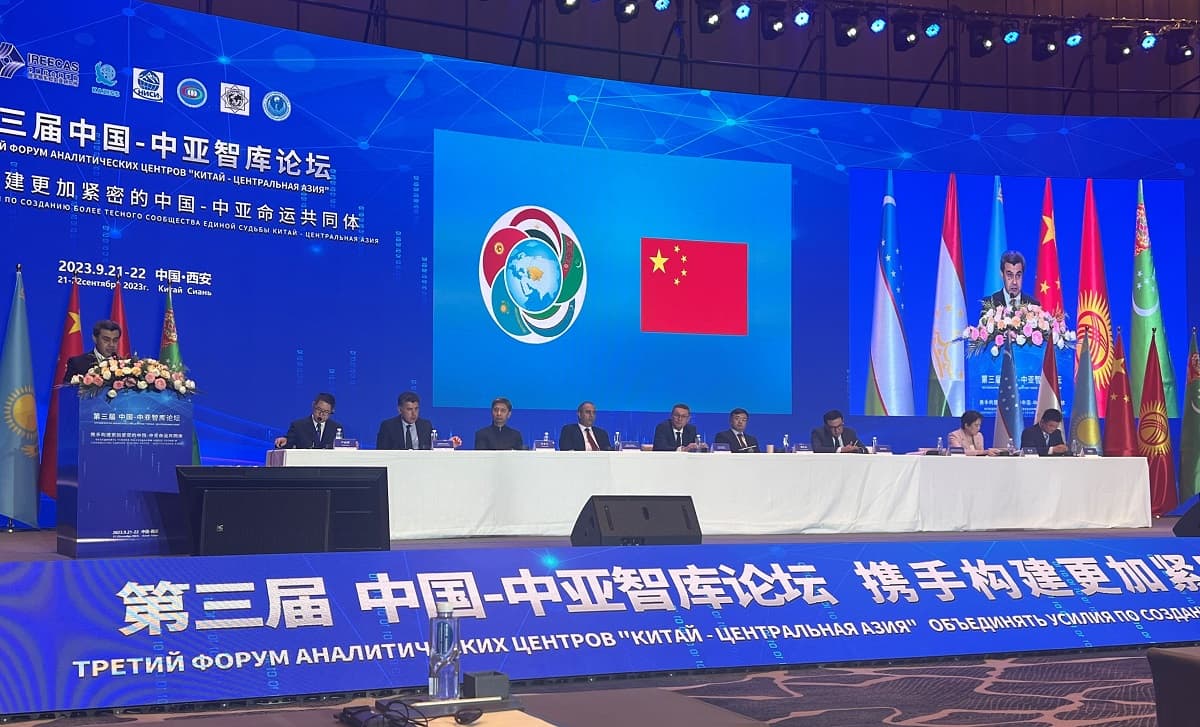
The Turkmen delegation is taking part in the third Forum of think tanks “China - Central Asia”, which takes place on September 21-23 in Xi’an, Shaanxi province.
The theme of the expert meeting was “Combining efforts to create a closer community of shared destiny China-Central Asia.”

For 30 years, China and the Central Asian countries have consistently deepened friendly ties, together they have paved a new path of good neighborliness and mutually beneficial cooperation, becoming an exemplary sample of building a new model of international relations. An important milestone was the first China- Central Asia Summit, which took place in May this year in Xi'an. The forum of think tanks was also included in the list of agreements and initiatives of this six- party format.

Turkmenistan contributed to the successful holding of the first and second Forum of think tanks, and this time the Institute of International Relations of the Ministry of Foreign Affairs of the country became its co-organizer along with the Institute of Russia, Eastern Europe and Central Asia of the Chinese Academy of Social Sciences and the institutes of strategic studies of Kazakhstan, Kyrgyzstan, Tajikistan and Uzbekistan.
Rector of the IIR of the Ministry of Foreign Affairs of Turkmenistan, Professor Dzhumamurat Gurbangeldyev, speaking at the forum, noted the relevance of its topics against the backdrop of the current difficult situation in the world, which requires an urgent solution to pressing problems.
Turkmenistan’s position is that the threats and challenges of the modern era can only be countered through joint efforts, using only political and diplomatic methods, through negotiations and confidential dialogue.

The peoples of Central Asia and China are connected by a vast experience of interaction since the times of the Great Silk Road, which became a factor in the development and progress of the entire world civilization.
Dzhumamurat Gurbangeldyev focused the attention of his colleagues on the results of the recently held Fifth Consultative Meeting of the Heads of State of Central Asia in Dushanbe and specifically on the initiatives and proposals put forward by President of Turkmenistan Serdar Berdimuhamedov to strengthen cooperation between the countries of the region.

First of all, he noted the initiative to create an Energy Dialogue of Central Asian countries, since energy is a key component of their economy. And today in Central Asia there is a process of formation of political, legal and economic conditions for sustainable energy interaction, focused not only on meeting domestic needs, but also on bringing energy resources to international markets.
Another initiative voiced by the head of the Turkmen state concerns the need to launch the Central Asian transport and logistics platform, which will contribute to the creation of transport hubs in the region, the formation of new transit corridors and increasing the efficiency of existing ones, as well as the optimization and improvement of customs, migration and other types of procedures along international transport routes.
The transport sector has always been the most important segment of the partnership. Through the joint efforts of the Central Asian states, conditions are systematically created for freight and passenger traffic between themselves and other regions of the Eurasian continent.

At the Dushanbe summit, among other documents, an Agreement was signed on strengthening the interconnectedness of land transport in Central Asia. This agreement is aimed at creating favorable conditions for the development of international transport, simplifying the process of transportation and transit, developing modern transport and logistics services, introducing innovative technologies, etc.
During the summit, a number of other important initiatives were put forward within Central Asia, but also relevant for other states. These are proposals to create a Council for New Technologies, a Regional Center for Technologies Related to Climate Change, and a regional Chamber of Commerce. The head of the Turkmen state also advocated the establishment of a Dialogue on Security and Cooperation under the auspices of the UN and the modernization of the Central Asian Water Strategy.
All of these are approaches aimed at bringing together and synchronizing the efforts of states to ensure sustainable, conflict-free development of the region, expanding its trade with the outside world, attracting investments and implementing large projects. The relevance of these initiatives goes beyond the region and is obvious to many countries of the world, including the actively progressing “China-Central Asia” format.

Other speakers at the forum also presented their countries' visions for future cooperation in the context of a changing Eurasian order, noting the need for joint development and a joint response to the complex and deeply transforming international situation and major global challenges.
ORIENT news